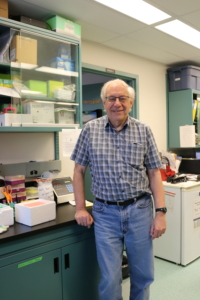August 21, 2024
How can we better prevent and manage cardiovascular disease? That question has been on award-winning St. Boniface Hospital researcher Dr. Peter Zahradka’s mind for the last 25 years.
“The biggest issue has been that if you have cardiovascular disease, more often than not you are unfortunately going to find out when you have a heart attack or a stroke,” said Dr. Zahradka, Principal Investigator in the Molecular Physiology Laboratory of the Canadian Centre for Agri-Food Research in Health in Medicine (CCARM) at St. B. “For me, that’s too far down the pathway from the beginning stage,” he said.
A colleague of his from Minnesota once pointed out that physicians have different medical tests to screen for cancers, which was an eye-opener for him. “We have Pap tests for cervical cancer in women, PSA tests for prostate cancer in men. We don’t have the same thing for cardiovascular disease. Why not?” he asked.
In recognition of his longtime work, he received the 2024 Duhamel Innovation Award, announced last April at St. Boniface Hospital Foundation’s Donor Celebration breakfast. The Foundation established the Award in 2004 to celebrate and encourage individuals like him who embody innovation and leadership in the advancement of health care for all Manitobans.
“I know we have been doing some very innovative research for more than 30 years now, but to be selected for the Duhamel Innovation Award was a really great honour. It was a surprise, and it made me happy,” he said with a laugh.
“The award gave me feedback that what we’ve been doing at CCARM really is meaningful. Yes, scientists can be insular; we are definitely focused on the work that we are interested in. But, at the same time, one of my biggest wishes was to have some of our work actually make a difference with the public.
“I think that’s where we are at,” he continued. “We are doing that. We have studies right now that may provide some information, within five years, that will inform the general public of things they can do to help their health.”
Focus on vascular disease

Physicians, including those working at St. Boniface Hospital, are doing wonderful things to keep patients with cardiovascular disease alive longer, he said. They are not as focused on finding the cause of the disease in the first place, however.
“We would like to intervene in the processes leading up to that, the early stage, so you don’t have to have that heart attack or stroke,” he said. “It’s also in the early stage when you have the potential to modulate it before it gets too far gone and the disease is already there.”
He and his colleagues at CCARM think the answer to the problem of heart disease could be hiding in what we eat.
“We have been looking at whether foods or food components may affect either body metabolism or the cardiovascular system. Those two things are closely linked,” he explained.
“Obesity. Diabetes. These are metabolic disorders, and these are patients who get cardiovascular disease. But a person dies because of the cardiovascular disease. So, what’s the link between them?”
To beat heart disease, Dr. Zahradka is convinced you have to focus on vascular disease. “Because if you’re going to have a heart attack, it’s a blockage in the vessel. If you’re going to have a stroke, it’s a blockage or a release of blood from a vessel,” he said.
“We want to know how metabolic dysfunction leads to cardiovascular disease, and if something in our diets can break that connection. We are trying to understand the processes involved in that linkage.”
Menopause linked to arterial stiffness
A different aspect of his research aligns with the Hospital’s women’s heart health initiative. He and his colleagues are looking at the causes of arteriosclerosis, or hardening of the arteries, which is a major part of the early process that leads to cardiovascular disease, he said.
They have found that menopause seems to have something to do with arterial stiffness. But what, and why?
“We have done over 25 clinical trials up to this point. It has been very exciting to have the facilities and the capability of doing that kind of work here. We can go from ‘bench’ in our labs here, to ‘bedside’ in the Asper Clinical Research Institute. That’s unique. It’s been wonderful being able to do that,” he said.
CCARM researchers have been measuring arterial stiffness in a wide range of men and women of various ages in several different studies and taking blood samples. Dr. Zahradka, along with his fellow principal investigators Dr. Harold Aukema and Dr. Carla Taylor, have been looking at molecules that are derived from polyunsaturated fatty acids. “That’s fish oil, canola oil, and flax oil,” he explained.
Technology in Dr. Aukema’s lab can analyze well over 200 compounds, or components of food, found in the blood samples. “We came up with three compounds that seemed to be related to arterial stiffness, which was lower in women before menopause and higher in women post-menopause.”
“We now have a clinical study where we are getting women around that menopausal age, and we will give them fish oil to see if it slows the development of arterial stiffness. And if it does, then that’s definitely something people can use off the shelf. Not an expensive treatment.”


